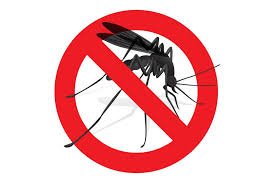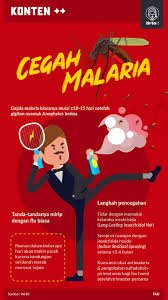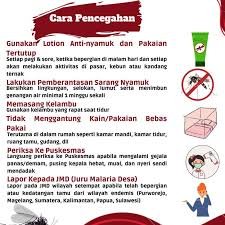PREVENTING THE SPREAD OF MALARIA DISEASE!!!
Malaria is a disease caused by a parasite that is transmitted through the bite of an infected Anopheles mosquito. This parasite is called Plasmodium and can cause fever, headache, chills, and fatigue. If left untreated, malaria can cause serious complications and even death. Malaria is common in tropical and subtropical regions around the world.
Dangers of Malaria for the Body
Malaria can be dangerous because the parasites that cause this disease can attack the red blood cells in the human body and destroy them. As a result, the body cannot transport oxygen effectively, causing anemia. If left untreated, malaria can cause serious complications such as organ damage, coma, and even death.
Malaria can also cause long-term health problems such as brain damage and physical disabilities in children who are infected while still in the womb. In addition, malaria can have a negative impact on economic and social development, especially in developing countries which are the most affected by this disease.
To avoid the dangers of malaria, it is important to prevent the disease, including:
- Avoid mosquito bites
Function by using insecticide-coated mosquito nets while sleeping, wearing clothes that cover the entire body, and using mosquito repellents such as lotions, sprays, or creams.
- Wear clothes that cover the body well
Wear clothes that cover your body well, such as long sleeves and trousers. Choose clothes that are loose and comfortable, especially if you are in a hot area and wear light or bright colored clothes because mosquitoes see dark colors more easily than light colors.
- Use prophylactic drugs
If you go to a malaria endemic area, be sure to take the recommended prophylactic drugs before and during your trip. Prophylactic drugs can help prevent malaria infection if you are bitten by a mosquito. Examples of these drugs include chloroquine, doxycycline, meflokin, atovaquone/proguanil, and primaquine depending on the predominant Plasmodium species in the area, the patient's medical history, and sensitivity to the drug.
- Protect yourself at certain times
Malaria-carrying mosquitoes are more active at night, so make sure we use mosquito nets at bedtime and avoid outdoor activities at night.
- Avoid areas affected by Malaria
If possible, avoid going to areas affected by malaria. However, if you have to go to a malaria-endemic area, make sure to follow the recommended preventive measures such as using drug prophylaxis, avoiding mosquito bites, and wearing clothes that cover your body.
- Cleaning the environment
Protect yourself and the environment from mosquitoes by keeping your home and surroundings clean. Remove places that can become breeding grounds for mosquitoes, such as stagnant water.
Hopefully by following these preventive measures, healthy friends can avoid malaria and reduce the risk of infection with this disease. If you feel the symptoms of malaria, immediately consult a doctor for the right treatment.
Best Regards
By @lingkar-photo


